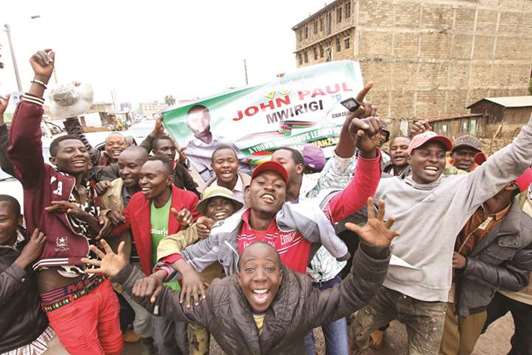A 23-year-old university student, who broke the mould of Kenya’s corrupt political system by getting elected to parliament after a campaign conducted on foot, says Kenyans are gradually learning not to choose leaders who simply buy their vote.
John Paul Mwirigi, was elected this month to the rural constituency of Igembe South, at the foot of Mount Kenya, beating four well-funded candidates, who roared around the tea and banana farming area in convoys of sleek four-by-four vehicles.
Mwirigi, who supported himself by casual employment at a tea factory before launching his campaign as an independent, said he had had to educate the electorate on the dangers of voting for candidates who give them handouts.
“I explained to them that a leader who is giving them a lot of money, that leader will not deliver but what he will do first is just take back his money, then he will stay for five years without doing anything for them,” he told Reuters by phone.
He is now Kenya’s youngest member of parliament.
Transparency campaigners says the East African nation has a history of high profile corruption in which ill-gotten proceeds are used to sway voters in general elections every five years.
Boniface Mwangi, a well known anti-corruption activist who ran for a parliamentary seat in the capital Nairobi, ended up third behind two large-party candidates.
Kenyan legislators enjoy some of the highest salaries in the world and other perks including lucrative travel and other allowances, as well as subsidised car and home loans.
Helicopters featured heavily in campaigns for the August 8 election as politicians combed for votes in remote villages, where voters often turned up for rallies wearing party colours distributed beforehand.
As an independent candidate without cash, Mwirigi did not enjoy that luxury — something that his opponents thought would doom his campaign.
His modest campaign drew taunts from his opponents.
“My opponents were just abusing me because they saw nothing in me,” he said. They mocked him for wearing just one sweater, having no car and not handing out any printed posters.
His win of more than 18,000 votes, against 15,000 for his closest competitor who was sponsored by the ruling Jubilee party, showed voters were getting wiser, he said.
“They understand that a good leader is not somebody who normally gives them cash. It is somebody who can advise them on how they can conduct themselves to get something,” he said.
His priorities include helping other young people in the area to start small businesses and get skills training to help them secure jobs, he said.

Supporters of Igembe South parliamentary candidate John Paul Mwirigi gather at their constituency tallying centre in Maua Girls High School, in Maua, on August 9.
